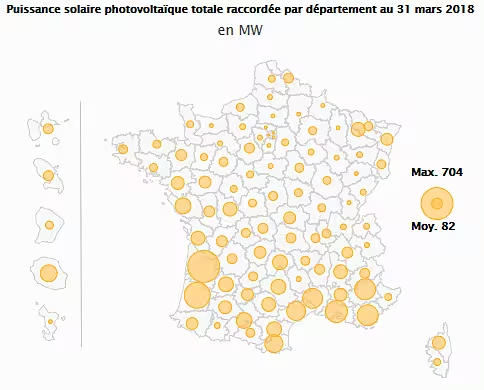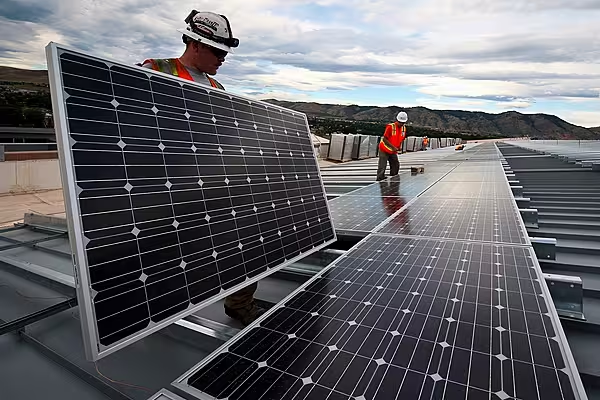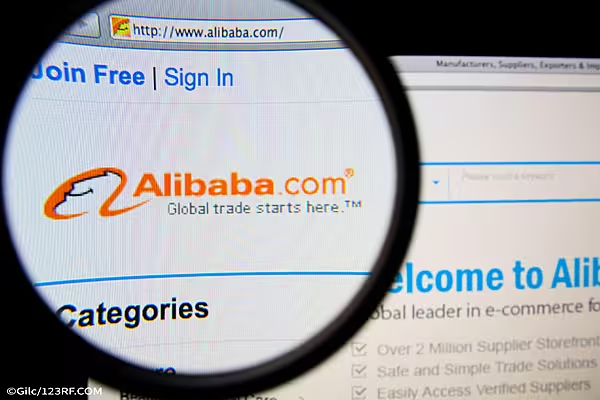France wants to generate just under a third of its energy from renewable sources by 2030, and out-of-town hypermarkets could play a key role in helping the country achieve that goal.
Retail giants like Intermarché, Leclerc, Carrefour and Auchan have invested massively in solar energy in recent years, and could play a major part in driving France's energy goals further, as well as addressing the government’s goal of reducing nuclear energy down to 50% of total power generated.
The Dawn Of French Solar Industry
France ranks fifth in terms of potential solar energy generation in Europe, according to Électricité de France (EDF), but because the country has been relying on nuclear energy for the past 50 years, solar only accounts for 1.6% of total energy generated. It accounts for 6% in Germany and 3.5% in the UK.

Total solar capacity by department in France, as of 31st of March 2018 (National Data Service)

The cost of solar energy production has dropped in France over the past few years. According to a report by the French Environment and Energy Management Agency ADEME, in 2017, it dropped by 11%, putting the cost of production at €55 M/Wh. This makes solar energy the most affordable renewable in France.
This is one of the reasons why things have started to change in France regarding the development of renewable energy. Through their own solar initiatives, retail groups are leading the charge in helping France raise its share in solar energy.
Accompanying the launch of its latest plan, 'Place au Soleil' (Let the Sun Shine), a report from the Ministry for an Ecological and Solidary Transition said, “Big retailers present a perfect use case for self consumption from solar energy: they consume most of their electricity at a time in the day when the sun is shining the brightest."
The report advocates for several measures to be implemented to mark the transition to solar. The first is a simplification in urban planning and zoning in order to bolster development in certain specific areas, such as parking lots in supermarkets and hypermarkets.
Another measure mentioned in the report is to allow third party financing for solar installations, enabling hypermarkets to rent solar installations to a specialist company.
Big Commitments By Big Players
In a interview with Le Parisien, Sébastien Lecornu, Secretary of State for the ministry mentioned that those commitments were “the results of several rounds of negotiations that were intended to convince retail groups to commit voluntarily, instead of having to follow a new piece legislation" that would mandate them to install a minimum surface of solar panels.
As a result, some groups are committing themselves to higher standards than others.
Les Mousquetaires has been the most ambitious, with the intention to install 500,000 square metres' worth of solar panels, an equivalent to 100 MWp (mega-watt peak) in the next five years on the roof of its buildings and in parking lots. In addition, the company said it will also install more than 1,500 charging points for electric vehicles by 2023.
By 2025, rival Leclerc said that it will install 500,000 square meters' worth of solar panels, corresponding to another 100 MWp.
Système U hasn’t committed itself to a specific number of solar panels but has announced that it will develop solar projects in 30% of its stores by 2025. The group also wants to equip a third of its stores with charging points for electric vehicles by 2025.
Auchan Retail will be installing 60 MWp worth of solar panels, as well as 103 charging points for electric vehicles across its parking lots by 2023.
Carrefour, as part of its Carrefour 2022 plan, wants to install 20 MWp worth of solar panels by 2022. It also aims to install charging points but the quantity of these is as yet to be determined. While it might appear to be the least ambitious with its plans, it plans to implement these in the quickest time frame.
Energy Audits
All the companies have also committed to energy audits for their stores, in order to maximise efficiency of the energy consumed and to see how they can reduce energy consumption across their operations.
Carrefour has gone the extra mile, saying it wants to obtain ISO 50001 for all stores fully owned by the group. The latest revision of the certification ISO 50001:2011 is only given to organisations that ‘Develop a policy for more efficient use of energy’ and ‘continually improve energy management.'
Across all major retailers, there is a commitment to introduce 310 MWp of solar capacity in the next decade in the parking lots of retailers across France. This is more solar capacity than the Cestas Solar Park, which is the largest installation of its kind in France, at 300MWp. At the time of opening in December 2015, this was also the largest solar park in Europe.
© 2018 European Supermarket Magazine – your source for the latest retail news. Article by Matthieu Chassain. Click subscribe to sign up to ESM: European Supermarket Magazine.














